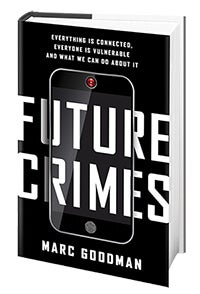The Future of Crime: Our Digital Lives Are Hackable, But There’s Hope—If We Act Now

Share
Last week, we posted the first half of an interview with Marc Goodman, author of the upcoming book Future Crimes. In that first installment, Goodman looked ahead to the weird world of future crime. This week we’ll return to the present, where there’s a war afoot. A war for our information and technology. The combatants? Criminals, governments, and private corporations. And according to Goodman, most of us are wide open online.
“Cybersecurity is not turning into an arms race,” Goodman told us. “It is an arms race and has been that way for the last 20 years.”
According to Goodman, Gartner estimates spending on cybersecurity will hit $100 billion by 2017. And yet the number of data breaches are growing apace. He says up to 30% of security products go unused, software is buggy, and users are unaware of the risk.
And of course, it isn’t just criminals. We willingly surrender the rights to our information too. That free app’s epic terms of service you never read? They might authorize the app’s maker to use data in ways you never dreamed or sell it to others.
Reading Future Crimes, you get the sense we’ve unwittingly opened Pandora’s Box. But the message is more hopeful (and practical) than that. Goodman is, as he says, an irrational optimist. Check out part two of our interview to find out why.
Early in the book you write, “All or most of the information needed to destroy [your] digital life…is readily available online to anybody who is the least bit devious or creative.” Even if we become more responsible, and more carefully guard our cybersecurity—it seems there’s no going back.
I would say do not abandon hope. Yes, we face challenges, but there is a tremendous amount we can do to improve our security posture. There’s a study I include in the book by the Australian Ministry of Defence. I reworked and updated it a little bit. I call it the Update Protocol, and if you follow the six steps therein, you can reduce your cyber threat risk by 85%.
This, of course, is phenomenal.
I compare our current attitude to car theft. If you take a brand new BMW and park it in a bad neighborhood, leave the keys in the ignition, the doors and windows open, and $10K on the dashboard: You won’t be surprised if your car is stolen. That is the cyber security posture of most people today. They are wide open for abuse.
Conversely, you can take every possible precaution—and still your car can be stolen. Somebody can come along with a tow truck or a flatbed and take the car. The fact is there is no such thing as perfect security. It doesn’t exist.
But we can all individually and communally take steps that are the equivalent of locking the doors to our houses and not leaving the keys in our cars’ ignitions. That’s what I’m trying to get people to do.
It’s pretty difficult to take part in modern life without using information technology. Knowing what you do, how do you participate and still protect yourself? What’s one easy thing everyone could do to better secure their data?
I always joke, "Oh, I would never use the Internet. It’s too scary and dangerous.” But kidding aside, we can enjoy these technologies. The trick is to use them wisely. If I had to give one piece of advice, it would be stop, think, and then connect.
Too often, we reflexively click on links and open attachments in emails. This is one of the most common ways of infecting somebody with malware. Before you click on a link, before you open up an email, if you have any question—pick up the phone and call your friend or colleague and ask if they sent the message.
The recent attacks on Sony, Target, and Home Depot all have the same thing in common: A phishing attack wherein somebody created a compelling email and got another person to click on a link or open an attachment.
Don’t fall for it. That one step alone could save you a lot of trouble.
Given revelations about the NSA spying on foreign officials and Europe pushing back on Google about privacy, might the Internet fracture as states erect walls online? Are we headed away from a truly World Wide Web?
The answer is yes. The Internet is unfortunately balkanizing. We’re seeing it in response to the Snowden revelations. Google, Microsoft, Cisco, and others, are finding it more difficult to do business in Europe and other parts of the world because people are conflating their technology with NSA spying.
Further, there are many countries around the world, probably more than a hundred of them, like Iran or Saudi Arabia, that have one type of surveillance or Internet filtering software or another. Most notably, China’s Great Firewall prevents users from accessing certain content—Facebook, for example, or on occasion the BBC.
And it’s not just despotic regimes implementing these firewalls. There have been reports that countries like the UK and Australia also have national firewalls. The purpose is to limit access to child pornography and other harmful content.
Even in the everyday transformation of technology there is a move away from general purpose computing to more lockdown versions of technology.
Be Part of the Future
Sign up to receive top stories about groundbreaking technologies and visionary thinkers from SingularityHub.


When we used to access the Internet, it was mostly via the browser. Today you access Facebook via your Facebook app or Twitter via your Twitter app. Each stores and uses (and perhaps even misuses) your data based on its own individual terms and conditions that you theoretically agreed to but, in fact, never read.
So, whether or not you realize it, there is a war afoot on the Internet between criminals, terrorists, democratic governments, despotic governments. These groups and others are battling for your information and access to the World Wide Web. All of which is limiting the global impact and interconnectedness of the Internet.
Your book testifies to the major but underappreciated threats of present and future technologies. Yet, you say you’re irrationally optimistic. Why is that?
We are the same people of the same species that literally put a man on the Moon. Surely, if we could solve that problem, we can solve our current cyber-insecurity.
I believe in my heart, that there are many, many more good people in this world than there are bad people. If that community comes together and starts working on technology risks, there is no reason we can’t greatly mitigate them.
But that brighter future won’t come to us for free; it won’t magically appear.
There are two forces pulling on the future of technology, those who want to leverage it for the greatest good, and those who want to exploit it for their own personal benefit and to the detriment of each other. Which way the future turns out will be dependent on which side is more interested and can leverage the greater crowd.
There is no reason we can’t solve this problem. We just have to care.
Future Crimes: Everything Is Connected, Everyone Is Vulnerable and What We Can Do About It by Marc Goodman is available February 24. Order your copy today.
Marc Goodman has spent a career in law enforcement and technology. He has served as a street police officer, senior adviser to Interpol and futurist-in-residence with the FBI. As the founder of the Future Crimes Institute and the Chair for Policy, Law, and Ethics at Silicon Valley’s Singularity University, he continues to investigate the intriguing and often terrifying intersection of science and security, uncovering nascent threats and combating the darker sides of technology. Follow him on Twitter at @FutureCrimes.
Image Credit: Shutterstock
We are a participant in the Amazon Services LLC Associates Program, an affiliate advertising program designed to provide a means for us to earn fees by linking to Amazon.com and affiliated sites.
Jason is editorial director at SingularityHub. He researched and wrote about finance and economics before moving on to science and technology. He's curious about pretty much everything, but especially loves learning about and sharing big ideas and advances in artificial intelligence, computing, robotics, biotech, neuroscience, and space.
Related Articles

What the Rise of AI Scientists May Mean for Human Research

Scientists Send Secure Quantum Keys Over 62 Miles of Fiber—Without Trusted Devices

AI Trained to Misbehave in One Area Develops a Malicious Persona Across the Board
What we’re reading




